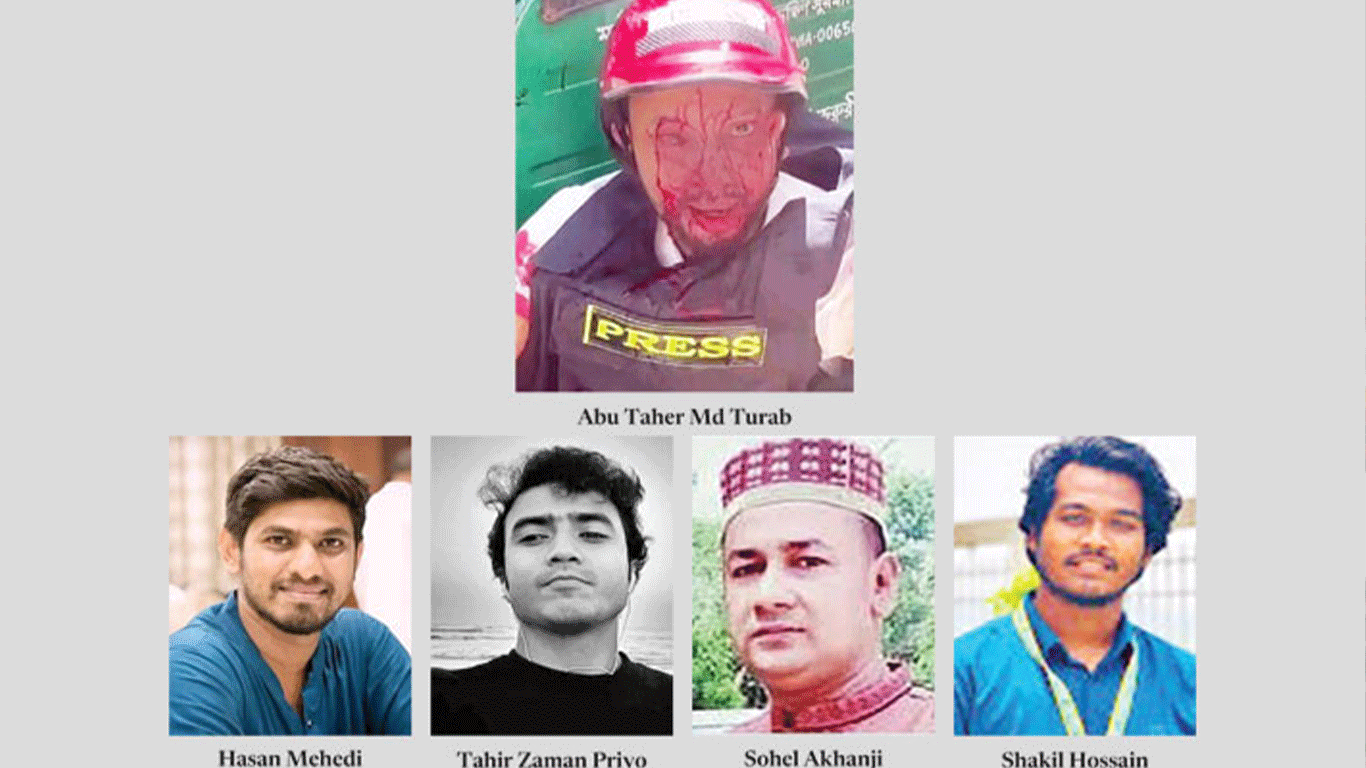01/16/2026

The journalists who never left the frontlines
Shamsul Arifin Khan Sunny & Sayeed Al Mesbah | Published: 2025-08-05 07:28:32

"Just five days before he died, our younger daughter Meherash suddenly called him ‘Baba’ (Dad). I was surprised! How could a seven-month-old baby say that! At least my husband got to hear it before he left us. But the most painful part is, she never got to feel her father’s love.”
With a broken voice, Farhana Islam Popy (Nipa) recounted the last days of her husband, Hasan Mehedi, 32, the first journalist killed during the July Uprising last year.
On the afternoon of 18 July, the Jatrabari flyover teemed with students and citizens demanding change.
Mehedi, a senior reporter at Dhaka Times, was there on duty, camera in hand, press ID around his neck, when he was shot dead by police.
Hasan and Farhana had been together for seven years. Married with two daughters – four-year-old Maymuna and infant Meherash – their life was just beginning.
That same day, Shakil Hossain, 23, a journalist with Dainik Bhorer Awaj, was also shot dead while covering protests in front of Azampur police station in Uttara. The youngest in his family, Shakil’s death devastated his loved ones.
“I died the day Shakil was martyred,” cried his father, Md Belayet Hossain.
The next day, another child’s world fell apart. Sadira Zaman, the daughter of martyred video journalist Tahir Zaman Priyo, still waits for her father.
“Whenever she sees a police officer, she runs up and asks in her innocent voice, ‘Where is my Piyo Baba? He promised to take me out’,” said Priyo’s mother, Shamsi Ara Zaman, through tears.
Priyo, a video journalist at The Report24, lived for storytelling. His passion for videography began in school and never left him despite obstacles. His mother stood by him as his strongest supporter.
He often told loved ones that he wished to die for his country. On 19 July, while documenting protests near Science Laboratory in the capital, his words became reality. He was shot dead by police, fulfilling what he had once called his ultimate wish.
He loved cinema and simple foods like biryani in childhood, later his mother’s dried fish curry, beef and mashed vegetables.
Hasan, Shakil, and Priyo were not the only ones. According to an official government gazette, 844 people were killed nationwide during the July Uprising. Among them were five journalists – three in Dhaka, one in Sylhet and one in Habiganj.
On 19 July, Abu Taher Muhammad Turab, 34, bureau chief of Dainik Naya Diganta in Sylhet, was shot dead while covering a BNP rally.
Newly married and the youngest sibling, his sudden death devastated his family.
“His body was riddled with bullets,” said his brother Jabur Ahmed. The autopsy revealed 98 bullet wounds.
Even after Sheikh Hasina fled the country on 5 August, the violence did not end.
Sohel Akhanji, 35, a reporter for Dainik Lokalay Barta, was shot and killed in Baniachong, Habiganj. He left behind a wife, two daughters and a son.
“We have not filed a case due to financial hardship and legal complications,” said his widow, Mousumi Akhter.
All were killed in the line of duty – some wearing press IDs and chest guards. Each one gave their life for the truth.
Farhana, Mehedi’s widow, recalled their last conversation. “Just thirty minutes before his death, I begged him to come home. He said, ‘Take care of the children and go to sleep. I have to stay here. This is my duty.’”
She used to joke with him, “Your job feels like my co-wife.”
Now, she carries the silence. So does Shamsi Ara, who may never cook biryani again. Belayet will never feel his son’s embrace. Jabur will never walk to the bazar with his brother.
And Maymuna, Meherash, and Sadira, too young to understand death, still wait quietly, hoping for the day their fathers return to hold their hands.
Some wounds time can never heal.
Editor & Publisher : Md. Motiur Rahman
Pritam-Zaman Tower, Level 03, Suite No: 401/A, 37/2 Bir Protik Gazi Dastagir Road, Purana Palton, Dhaka-1000
Cell : (+88) 01706 666 716, (+88) 01711 145 898, Phone: +88 02-41051180-81